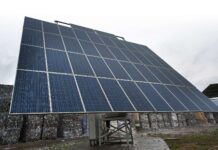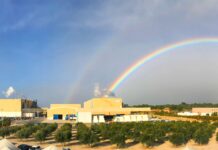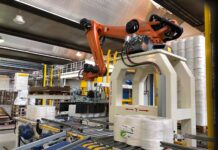Government cash incentives, a growing middle class, awareness of environmentally-friendly products, changing priorities… it all adds up to a dynamic future as the market catches up with Papelera San Andrés de Giles. A TW report.
The 90 minutes drive to Papelera San Andrés de Giles’s (PSAG) family-run mill quickly leaves behind the hustle and bustle and colour of Buenos Aires and in its place are mile after mile of rural roads, farm land and flat fields.
That repetition is abruptly brought to an end when TW is greeted by Andrés Gagliardi, who heads up the sales department and is the grandson of the company’s founder José Sassone, and also by plant manager Sebastian Schiaffino. There appears, as the next couple of hours reveal, to be every reason for their optimism.
The business was established in 1980, manufacturing toilet paper and toilet rolls and over the years has expanded its product offering while keeping a keen eye on market trends. It has grown organically through investing in high-tech technologies; a market strategy that it prioritises to this very day.
It now manufactures 18,000tpy of toilet paper and napkins, has its own brand, sells to the AfH market and also produces private label products for companies such as Walmart and Carrefour. Its business strategy is three-fold: sell jumbo rolls directly; supply jumbo rolls cut and sliced to companies such as Procter & Gamble; and sell them directly to the end consumer.
“We’re the pioneers of printed tissue in Argentina. And now we’re the only ones that can make it in six colours.”
Most recently, it has broadened its product offering to include handkerchiefs, which Gagliardi says is an area of the local tissue market that has seen a substantial increase in demand. Another growth area is environmental products.
“It’s one of the main reasons there’s growth here,” he adds.
“The government has established a set of cash incentives to encourage people to consume more environmentally friendly products. So we’re definitely seeing an increase in demand for sustainable products that’s coming from the actual consumer.”
“We’re seeing an increase in demand for 2-ply products, simply because people have more money now and are beginning to consume different sorts of products.”
Kitchen roll is also increasingly becoming a habit for Argentinean households. “We’re seeing a shift in incomes, people are becoming wealthier and the middle class is growing and with that their consumption habits are changing. We’re seeing more and more people trying kitchen roll, whereas before they didn’t know about it. Now it’s become a habit for many that they can’t do without.”
More no-frill products have also come onto the market, more often than not private label lines. At the end of 2013 the sector now commands an 11% value share in Argentina, up from just 2% five years earlier and way ahead of the reported regional average of 4%.
Per capita, Gagliardi says that tissue demand was 5.5 kilos a few years ago, and now it’s 7.5 kilos. “This is why we’ve invested in the Futura line and are looking to invest in the third converting line. We need to keep up with demand.”
The Futura line was installed last year, and Schiaffino says the technology, JOI 012, is the first ever embosser to feature a steel marrying roll instead of the industry standard rubber roll. It will produce new products for the business, a kitchen towel and toilet tissue. “We’re also doing four-colour printing with the Futura line,” he says. “We’re seeing an increase in demand for 2-ply products, simply because people have more money now and are beginning to consume different sorts of products.”
The business is on the lookout for a third napkin line and it has plans to make the investment by 2015. “We are seeing a big increase in demand for napkin products in Argentina,” Schiaffino says. “This demand has mostly come from some tissue production leaving the market here.”
“Consumers are also asking for higher quality products,” he adds. “And in the last five years we’ve seen an increase in demand for decorated tissue products. We’re the pioneers of printed tissue in Argentina. We started 20 years ago printing on kitchen towels and napkins. Now, we are the only company that can make these products.”
Quirks of the company’s products also include 8m long three, two and one ply products. Gagliardi says the one ply market is a special market in Argentina and the company produces a lot of three rolls at 8 metres. Demand for two-ply tissue products is also increasing because people have more money to consume that sort of product and they see the difference between one and two ply and then don’t want to go back to one ply. “Our 80m single ply is very successful, but consumers are asking for more quality. In the past five years, decorative tissue has also increased. We’re the pioneers of printed tissue in Argentina. And now we’re the only ones that can make it in six colours.”
As for the country’s location to Brazil, Gagliardi adds that the tissue trends seen there aren’t necessarily reflected in the Argentinian market. “We don’t follow Brazilian trends, we’re not competitive for Brazil. But we do export into Chile and Uruguay.”
We want to go forward focusing on technology, efficiency and high quality products.
He adds that the company’s strength is its technology. “We want to go forward focusing on technology, efficiency and high quality products. With this new machine, we want to grow all our products. We have a 7% share in the Argentinean tissue market and we’re looking to grow that. We want to have 10% by 2015. We have our new line and then the new converting line, as well as being the first and only mill that has a totally automatic stacking system which was supplied by Electric80 and is the first in the world in the tissue industry that has five floors.
“We will build a new production area also to house the new line. Our philosophy is to always move and develop across every aspect of our business. Our aim: to provide quality in the product through our technology. Technology is our vision.”
Papelera San Andrés de Giles’s mill in Argentina: “We have a 7% share in the Argentinean tissue market and we’re looking to grow that. We want to have 10% by 2015.”
The most modern depot in South America powered by Eletric80.
The new Futura Tango Line that prints in 4 colours.
[box type=”info”]
FACTFILE – Papelera San Andres de Giles
Location – San Andres de Giles, Argentina
Founder – Jose Sassone
Staff – 140
Machines – PM1, Toscotec-supplied machine. Two converting lines supplied by Perini and Futura
Products – toilet roll, handkerchiefs, napkins[/box]

































